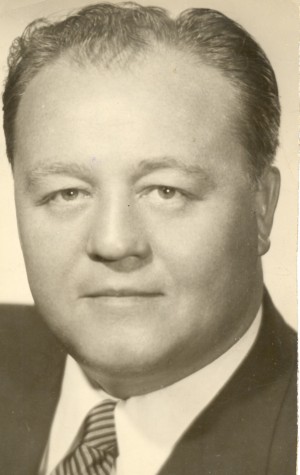The whistle-blower in the Harry Stonehill case
Now that a lot of whistle-blowers are hogging the headlines, a good question is: Whatever happened to the first big whistle-blower in the Philippines?
I am referring to Meinhart Spielman, the man who spilled the beans on Harry Stonehill, a powerful American in the 1960s who made his way to the top of the corporate heap allegedly by bribing Philippine officials.
Nobody knows Spielman’s whereabouts and a lot of people think he was killed in Sulu province or drowned somewhere.
But believe it or not, I found him at a nursing home called Forest Grove in Calgary, Alberta, Canada, in the early 1990s. But this is going ahead of the story.
Very few, if none at all, of this generation know about Harry Stonehill. Some sources on the Internet say he was an American soldier who served in the US liberation forces in the Philippines during World War II. After the war, he decided to stay in the Philippines and started a business, and in less than two decades was able to build a business empire reportedly valued at $50 million.
Stonehill started 18 corporations and they fast became promising and high-earning business ventures. He was in such businesses as tobacco, glass manufacturing, cement production and many others.
He also originally had this bright idea of reclaiming Manila Bay. He claimed he owned the land where the Cultural Center of the Philippines complex now stands.
Where does Meinhart Spielman come in?
Spielman was manager of Harry Stonehill’s US Tobacco Corp. and an executive of Stonehill’s group of companies. After a violent confrontation over intracompany matters, Spielman walked into the US Embassy in Manila on Dec. 9, 1961, to present documents that accused Stonehill of serious acts of wrongdoing. Some of his charges were bribery, influence peddling and economic sabotage. Spielman also presented a blue book that listed top Philippine senators and even
the President then [Diosdado Macapagal—Ed.] as having received money from Stonehill.
Stonehill was deported without trial. Not long after disclosing the alleged sins of Stonehill, Spielman disappeared from the scene. There were accounts that he was discreetly put away or drowned in the Sulu Sea.
My interest in Stonehill and Spielman was a result of my handling a project sometime in 1989 with a public relations guy named Mars Marquez. Stonehill longed to return to the Philippines, which he considered his home, and reclaim the properties he left here.
Stonehill requested a public relations agency to revive in the Filipinos’ minds the good deeds that he had done for the Philippines. He briefly visited Manila a year after the 1986 Edsa People Power Revolution and planned to recover his wealth.
He was still alive, although already powerless, when I met Spielman at a nursing home in Alberta sometime in the early 1990s. I worked as a nursing aide in Forest Grove Nursing Home where he was being cared for.
Spielman was old, emaciated and sick. He was literally skin and bones, but his mind was still sharp. He lived in a small room and was taken care of by nurses and nursing assistants in shifts.
Nobody visited him. I was a new immigrant in Canada and my memory of our client Stonehill was still fresh in my mind. What attracted me to this old man was his name. Was this the man who was the whistle-blower in the case of Stonehill who got deported for alleged tax evasion, bribery and corruption in the Philippines?
Out of curiosity, I decided to visit him in his room and say hello, expecting him to give me a warm greeting.
One day, I found the courage to do that. I went to his room and said to him, “Hi, Mr. Spielman. Good morning! I am Sylvia Europa from Manila, Philippines. By the way, do you know Harry Stonehill?”
That elicited a violent outburst I never expected from an old, dying man.
“Get off here! Get out of here!” he screamed.
I felt like I had discovered a secret that no one in the Philippines knew. This was bolstered by the fact that unlike other patients, nobody visited Spielman. He died a few months later and the Canadian government buried him.
To this day, I wonder if I had really found Meinhart Spielman. I wanted to write about him then but I was not sure if people would be interested.
Very few knew about him and Harry Stonehill, so I relegated it to the back of my mind. But with all these whistle-blowers talking about graft and corruption, and being hailed as heroes, I thought it was time to resurrect the first whistle-blower in the Philippines—Meinhart Spielman.
Spielman would have opened a can of worms and had top officials in the Philippines at that time indicted. But like Harry Stonehill, he was spirited away fast.
Was he really killed, as some people claimed? Or was he allowed to disappear and land in Canada where he led a long, lonely, solitary life?
I found him alone in a humble nursing home. Who supported him? It was obvious he had no family connections in Canada. Nobody ever visited him and he was probably on welfare. Canada had to bury him alone; there was no family to grieve for him.
Stonehill was deported and was never allowed to return until after the Edsa People Power Revolution. Would he and Spielman have changed Philippine history if they were allowed to stay here and testify against corrupt officials at that time?
Poor Spielman had to hide in Canada to protect himself—and perhaps to protect some big politicians here.
(Editor’s Note: Sylvia Europa-Pinca is president and CEO of Europa Public Relations Inc.)
RELATED STORIES
Stonehill and pork: Prelude to farce?















